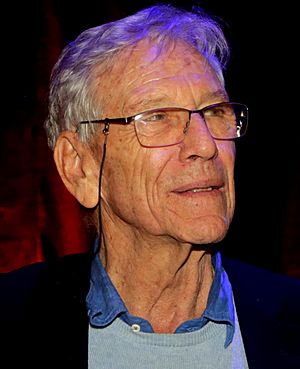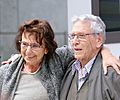Amos Oz facts for kids
Quick facts for kids
Amos Oz
|
|
|---|---|

Oz in 2017
|
|
| Born | Amos Klausner 4 May 1939 Jerusalem, Mandatory Palestine |
| Died | 28 December 2018 (aged 79) Petah Tikva, Israel |
| Occupation | Writer, novelist, journalist, academic |
| Nationality | Israeli |
| Notable awards |
|
| Spouse |
Nily Zuckerman
(m. 1960) |
| Children | 3 |
Amos Oz (born Amos Klausner; 4 May 1939 – 28 December 2018) was a famous Israeli writer, novelist, and journalist. He was also a professor who taught Hebrew literature at Ben-Gurion University of the Negev. From 1967 onwards, Oz was a strong supporter of a two-state solution to the Israeli–Palestinian conflict. This idea suggests that two separate states, one for Israelis and one for Palestinians, should live side-by-side in peace.
He wrote 40 books, including novels, short stories, children's books, and essays. His books have been published in 45 languages, which is more than any other Israeli writer. He received many important awards, like the Friedenspreis des Deutschen Buchhandels (a German peace prize), the Legion of Honour from France, and the Israel Prize.
Many people saw Oz as one of "Israel's most prolific writers and respected intellectuals," as The New York Times said when he passed away.
Contents
About Amos Oz
Early Life and Family
Amos Klausner (who later changed his name to Oz) was born in 1939 in Jerusalem, which was then called Mandatory Palestine. He grew up as the only child of Fania and Yehuda Arieh Klausner. His parents had moved to Mandatory Palestine and met while studying at the Hebrew University of Jerusalem.
His father's family came from Lithuania, where they were farmers. His father studied history and literature but worked as a librarian. Oz's mother grew up in Rivne (now in Ukraine). She was a very smart and cultured person who studied history and philosophy at Charles University in Prague. She had to stop her studies when her father's business faced problems during the Great Depression.
Oz's parents spoke many languages, but they only allowed him to learn Hebrew, which became the official language of Israel. Many of his family members had strong political views, supporting a group called Revisionist Zionism. His great-uncle, Joseph Klausner, was a well-known scholar who influenced young Amos.
Oz described himself as an "atheist of the book," meaning he was not religious but deeply valued his Jewish heritage through its books and texts. He went to a religious school because the other option was a socialist school, which his family didn't like. The famous poet Zelda Schneersohn Mishkovsky was one of his teachers.
During the Holocaust, some of his family members were killed in Lithuania. His mother passed away in January 1952 when he was 12 years old.
Joining a Kibbutz and Military Service
When he was 14, Oz became a Labor Zionist, which is a movement that combines Jewish nationalism with socialist ideas. He left home and joined Kibbutz Hulda. A kibbutz is a community where people live and work together, sharing everything. There, he was adopted by a family and changed his last name to "Oz," which means "courage" in Hebrew. He once joked that he was "a disaster as a laborer" on the kibbutz.
At first, the kibbutz only gave him one day a week to write. When his novel My Michael became very popular, he said, "I became a branch of the farm." Even then, he was only allowed three days a week for writing.
Oz served in the Israel Defense Forces in the Nahal Brigade. He fought in border battles with Syria. After his mandatory army service, his kibbutz sent him to the Hebrew University of Jerusalem, where he studied philosophy and Hebrew literature. He graduated in 1963 and started teaching at the kibbutz high school while continuing to write. He also served as an army reservist in a tank unit during the Six-Day War and the Yom Kippur War.
Later Life and Family
Oz married Nily Zuckerman in 1960, and they had three children. They lived in Kibbutz Hulda until 1986, when they moved to Arad in the Negev desert. They moved to help their son Daniel, who had asthma. Oz became a full professor of Hebrew literature at Ben-Gurion University of the Negev from 1987 to 2014. He also taught and visited other universities around the world. In 2014, his family moved to Tel Aviv. His oldest daughter, Fania Oz-Salzberger, is now a history professor.
Amos Oz passed away from cancer on 28 December 2018, at the age of 79. He was buried at Kibbutz Hulda.
Literary Career
Amos Oz published his first book, Where the Jackals Howl, a collection of short stories, in 1965. His first novel, Another Place, came out in 1966. After that, he usually published about one book a year. He became a key figure in the Israeli "New Wave" movement in literature during the 1960s.
Oz wrote 40 books in total. These include 14 novels, five collections of stories, two children's books, and twelve books of articles and essays. His works have been translated into about 45 languages. In 2007, a part of the Chinese translation of A Tale of Love and Darkness was the first modern Hebrew book to appear in an official Chinese school textbook.
His writings often showed characters in a realistic way, sometimes with a bit of humor. He also wrote about life in the kibbutz, sometimes with a critical view. Oz said that reading an American short story collection called Winesburg, Ohio in 1959 inspired him to "write about what was around me."
In his 2004 essay "How to Cure a Fanatic," Oz suggested that the Israeli–Palestinian conflict is not mainly about religion or cultures. Instead, he saw it as a dispute over land. He believed it would be solved not by better understanding, but by difficult compromises.
Views on Peace and Politics
Oz was one of the first Israelis to support a two-state solution for the Israeli–Palestinian conflict after the Six-Day War in 1967. He wrote in an article that "Even unavoidable occupation is a corrupting occupation." In 1978, he helped start Peace Now, a group that works for peace between Israelis and Palestinians.
He did not like the building of Israeli settlements. He was also among the first to praise the Oslo Accords, which were peace agreements between Israel and the PLO. In his speeches and essays, he often spoke out against those who were against Zionism (the movement for a Jewish homeland) and always stressed his own Zionist identity. He was seen as a strong voice for the left-wing Zionist movement.
Oz supported Israel's actions during the Second Lebanon War in 2006. He wrote that "The Israeli peace movement should support Israel's attempt at self-defense." However, he later changed his mind as the war continued.
Before the 2008–2009 Israel–Gaza conflict, Oz signed a statement supporting military action against Hamas in the Gaza Strip. But two weeks later, he called for a ceasefire and spoke about the difficult conditions there. He said that Hamas was responsible for the violence, but it was time for a ceasefire.
In a 2010 article in The New York Times, he wrote that "Hamas is not just a terrorist organization. Hamas is an idea... To defeat an idea, you have to offer a better idea." He believed Israel needed to sign a peace agreement with President Mahmoud Abbas and his Fatah government in the West Bank.
In 2011, Oz sent a copy of his book A Tale of Love and Darkness to an imprisoned Palestinian leader, Marwan Barghouti. He wrote a personal message hoping they could understand each other and find peace.
Oz also supported Israeli actions in Gaza during the 2014 Israel–Gaza conflict. He criticized the tactic of using human shields, which was believed to be used by Hamas at the time. He asked, "What would you do if your neighbor... starts shooting machine-gun fire into your nursery?"
Awards and Recognition
Amos Oz received many important awards and honors throughout his life:
- 1965 – Kugel Prize from the city of Holon
- 1976 – Brenner Prize
- 1983 – Bernstein Prize for his novel A Perfect Peace
- 1984 – Made an Officer of the Ordre des Arts et des Lettres in France
- 1986 – Bialik Prize for literature
- 1988 – French Prix Femina étranger
- 1992 – Friedenspreis des Deutschen Buchhandels (Peace Prize of the German Book Trade)
- 1997 – Named to the French Legion of Honour
- 1998 – Israel Prize for literature, which is one of Israel's highest honors
- 2004 – Welt-Literaturpreis from the German newspaper Die Welt
- 2004 – Ovid Prize from Romania
- 2005 – Goethe Prize from the city of Frankfurt, Germany, for his life's work
- 2006 – Jerusalem-Agnon Prize
- 2006 – Corine Literature Prize (Germany)
- 2007 – Prince of Asturias Award in Literature (Spain)
- 2007 – His book A Tale of Love and Darkness was named one of the ten most important books since Israel was created.
- 2008 – German President's High Honor Award
- 2008 – Primo Levi Prize (Italy)
- 2008 – Heinrich Heine Prize of Düsseldorf, Germany
- 2008 – Tel Aviv University's Dan David Prize for "Creative Rendering of the Past"
- 2013 – Franz Kafka Prize
- 2014 – Order of Civil Merit
- 2014 – Siegfried Lenz Prize, granted by the City of Hamburg
- 2015 – The film A Tale of Love and Darkness, based on his book, premiered at the Cannes film festival. It was directed by and starred Natalie Portman.
- 2015 – Internationaler Literaturpreis – Haus der Kulturen der Welt, Germany, for his novel Judas
- 2015 – Honorary degree by the University of Milan
- 2015 – Park Kyong-ni Prize, a South Korean award
- 2018 – Stig Dagerman Prize, Sweden (for "Judas")
Published Works
Amos Oz wrote many novels, novellas, and collections of short stories in Hebrew. He also wrote essays and articles for newspapers in Israel and other countries.
Non-fiction
- In the Land of Israel (essays on political issues)
- Israel, Palestine and Peace: Essays (1995)
- Under This Blazing Light (1995)
- Israeli Literature: a Case of Reality Reflecting Fiction (1985)
- The Slopes of Lebanon (1989)
- The Story Begins: Essays on Literature (1999)
- A Tale of Love and Darkness (2002)
- How to Cure a Fanatic (2006)
- Jews and Words (2012) (with Fania Oz-Salzberger)
- Dear Zealots: Letters from a Divided Land (2017)
- What's in an Apple (Conversations with Shira Hadad), 2018
Fiction
- Where the Jackals Howl (1965)
- Elsewhere, Perhaps (1966)
- My Michael (1968)
- Unto Death (1971)
- Touch the Water, Touch the Wind (1973)
- The Hill of Evil Counsel (1976)
- Soumchi (1978)
- A Perfect Peace (1982)
- Black Box (1987)
- To Know a Woman (1989)
- Fima (1991)
- Don't Call It Night (1994)
- Panther in the Basement (1995)
- The Same Sea (1999)
- The Silence of Heaven: Agnon's Fear of God (2000)
- Suddenly in the Depth of the Forest (A Fable for all ages) (2005)
- Rhyming Life and Death (2007)
- Scenes from Village Life (2009)
- Between Friends (2012)
- Judas (2014)
Short stories
- "Heirs" (2007)
- "Waiting" (2008)
- "The King of Norway" (2011)
See Also
 In Spanish: Amos Oz para niños
In Spanish: Amos Oz para niños
- Amos Oz: The Nature of Dreams
- List of Israel Prize recipients
- List of Bialik Prize recipients
Images for kids
-
Amos Oz speaking at Tel Aviv University, faculty of medicine in 2011
-
Amos Oz in 2015, with Mirjam Pressler
 | Sharif Bey |
 | Hale Woodruff |
 | Richmond Barthé |
 | Purvis Young |






